七年级报纸电子版·深圳版(第10期)
七年级报纸电子版·深圳版(第29期)
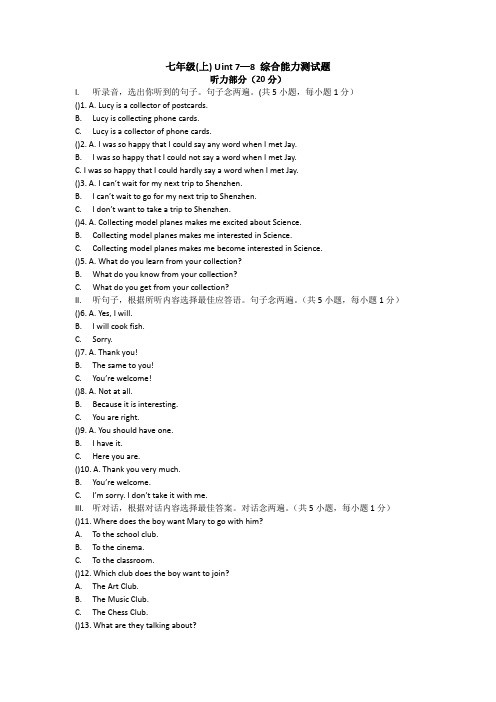
七年级(上) Uint 7—8 综合能力测试题听力部分(20分)I. 听录音,选出你听到的句子。
句子念两遍。
(共5小题,每小题1分)()1. A. Lucy is a collector of postcards.B. Lucy is collecting phone cards.C. Lucy is a collector of phone cards.()2. A. I was so happy that I could say any word when I met Jay.B. I was so happy that I could not say a word when I met Jay.C. I was so happy that I could hardly say a word when I met Jay.()3. A. I can’t wait for my next trip to Shenzhen.B. I can’t wait to go for my next trip to Shenzhen.C. I don’t want to take a trip to Shenzhen.()4. A. Collecting model planes makes me excited about Science.B. Collecting model planes makes me interested in Science.C. Collecting model planes makes me become interested in Science.()5. A. What do you learn from your collection?B. What do you know from your collection?C. What do you get from your collection?II. 听句子,根据所听内容选择最佳应答语。
英语周报七年级牛津(SZY)第10期

第三版 语言知识部分
( B ) 6. — The land is ______.
— We can’ t grow any plants here.
A. rich B. dry C. flat ( C) 7.— Do you have any______abroad? — Yes. My aunt lives in New Zealand. A. friends C. relatives B. neighbours
A. jump第三版 语言知识部分
( C ) 3. If you
something, you hit it with your foot. A. touch B. hold C. kick
第三版 语言知识部分
B. 根据句意, 选择最恰当的词或短语填空。 ( A ) 4. — I think the cat went this way. Look,here are its______. — Follow them and we can find it. A. footprints B. letters C. messages ( C) 5. — It’ s ______today. — How thick the snow on the ground is! A. rainy B. windy C. snowy
第三版 语言知识部分
( B )10 . — What did you do in the winter
holiday? — I took a trip to Suzhou with my parents. A. went fishing B. went travelling C. went skating
第三版 语言知识部分
(2014春)七年级报纸电子版·牛津深圳版(第15期)

(2014春)初一牛津报纸电子版(第15期)综合知识专练( For Unit 3-4)词语狙击Vocabularyn. radio, programme, pet, towel, bottom, airport, pine, branch, root, example, gas, oxygen, furniture, disease, holev. mean, allow, apologize, lead, bark, wake, appear, act, climb, save, discuss, fight, produce, imagine, dig, carryadj. blind, helpful, dark, major, harmful, convenientadv. anywhere, finallypron. nothingprep. against1. arrive at2. by oneself3. lead (sb.) to4. fall asleep5. wake up6. get down7. fire engine8. take in9. come from 10. for example 11. in fact 12. look around 13. (be) made of 14. millions of 15. (be) good for完璧归赵根据句意及首字母提示填写单词, 使句子完整、通顺。
1. My father likes to listen to the r ______in the morning every day.2. If you are hungry, there is an apple at the b______ of my bag. You can eat it.3. The dog suddenly started b______ at us.4. My uncle will arrive at the a _______ in two hours, and then he will fly to Beijing.5. He was so brave that he c _________ to the top of the high mountain at last.6. The old man likes watching TV. He likes all kinds of p_______ on TV.7. Our teacher often gives us some e_______ to explain the difficult words.8. Trees are very important because they can give out o________ for us to breathe.9. There is a lot of new f _______ in his living room, such as the sofa and the table.10. It is d______ outside at night, but the man has to go out to work.中西合璧根据句意及汉语提示填写单词,使句子完整、通顺。
(2014春)七年级报纸电子版·牛津深圳版(第05期)
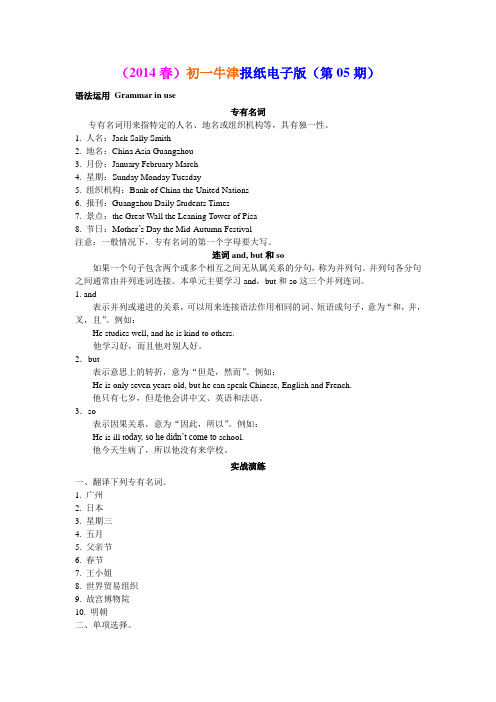
(2014春)初一牛津报纸电子版(第05期)语法运用Grammar in use专有名词专有名词用来指特定的人名、地名或组织机构等,具有独一性。
1. 人名:Jack Sally Smith2. 地名:China Asia Guangzhou3. 月份:January February March4. 星期:Sunday Monday Tuesday5. 组织机构:Bank of China the United Nations6. 报刊:Guangzhou Daily Students Times7. 景点:the Great Wall the Leaning Tower of Pisa8. 节日:Mother’s Day the Mid-Autumn Festival注意:一般情况下,专有名词的第一个字母要大写。
连词and, but和so如果一个句子包含两个或多个相互之间无从属关系的分句,称为并列句。
并列句各分句之间通常由并列连词连接。
本单元主要学习and,but和so这三个并列连词。
1. and表示并列或递进的关系,可以用来连接语法作用相同的词、短语或句子,意为“和,并,叉,且”。
例如:He studies well, and he is kind to others.他学习好,而且他对别人好。
2.but表示意思上的转折,意为“但是,然而”。
例如:He is only seven years old, but he can speak Chinese, English and French.他只有七岁,但是他会讲中文、英语和法语。
3.so表示因果关系,意为“因此,所以”。
例如:He is ill t oday, so he didn’t come to school.他今天生病了,所以他没有来学校。
实战演练一、翻译下列专有名词。
1. 广州___________________2. 日本____________________3. 星期三__________________4. 五月____________________5. 父亲节__________________6. 春节____________________7. 王小姐__________________8. 世界贸易组织____________________9. 故宫博物院_____________________10. 明朝___________________________二、单项选择。
国内报纸(电子版)
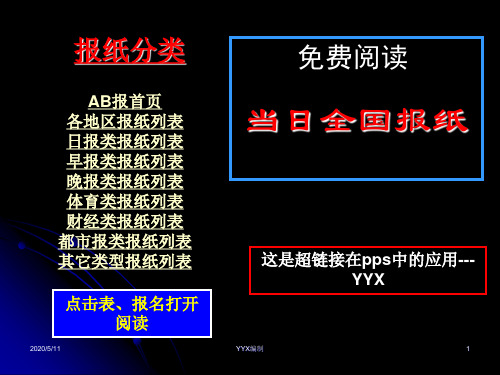
AB 报首页各地区报纸列表日报类报纸列表早报类报纸列表晚报类报纸列表体育类报纸列表财经类报纸列表都市报类报纸列表其它类型报纸列表报纸分类免费阅读当日全国报纸点击表、报名打开阅读这是超链接在pps 中的应用---YYX报纸列表南方都市报,南方都市报电子版,南方都市报电子报,南方都市报数字版扬子晚报,扬子晚报电子版,扬子晚报电子报,扬子晚报数字版京华时报,京华时报电子版,京华时报电子报,京华时报数字版人民日报,人民日报电子版,人民日报电子报,人民日报数字版新民晚报,新民晚报电子版,新民晚报电子报,新民晚报数字版现代快报,现代快报电子版,现代快报电子报,现代快报数字版广州日报,广州日报电子版,广州日报电子报,广州日报数字版新快报,新快报电子版,新快报电子报,新快报数字版济南时报,济南时报电子版,济南时报电子报,济南时报数字版新华每日电讯,新华每日电讯电子版,新华每日电讯电子报,新华每日电讯数字版晶报,晶报电子版,晶报电子报,晶报数字版羊城晚报,羊城晚报电子版,羊城晚报电子报,羊城晚报数字版武汉晚报,武汉晚报电子版,武汉晚报电子报,武汉晚报数字版中国证券报,中国证券报电子版,中国证券报电子报,中国证券报数字版重庆晚报,重庆晚报电子版,重庆晚报电子报,重庆晚报数字版都市女报,都市女报电子版,都市女报电子报,都市女报数字版长江商报,长江商报电子版,长江商报电子报,长江商报数字版东南快报,东南快报电子版,东南快报电子报,东南快报数字版深圳晚报,深圳晚报电子版,深圳晚报电子报,深圳晚报数字版都市快报,都市快报电子版,都市快报电子报,都市快报数字版南国早报,南国早报电子版,南国早报电子报,南国早报数字版钱江晚报,钱江晚报电子版,钱江晚报电子报,钱江晚报数字版东莞时报,东莞时报电子版,东莞时报电子报,东莞时报数字版文汇报,文汇报电子版,文汇报电子报,文汇报数字版楚天都市报,楚天都市报电子版,楚天都市报电子报,楚天都市报数字版北京晨报,北京晨报电子版,北京晨报电子报,北京晨报数字版南方日报,南方日报电子版,南方日报电子报,南方日报数字版香港文汇报,香港文汇报电子版,香港文汇报电子报,香港文汇报数字版证券时报,证券时报电子版,证券时报电子报,证券时报数字版成都晚报,成都晚报电子版,成都晚报电子报,成都晚报数字版新安晚报,新安晚报电子版,新安晚报电子报,新安晚报数字版新闻晨报,新闻晨报电子版,新闻晨报电子报,新闻晨报数字版合肥晚报,合肥晚报电子版,合肥晚报电子报,合肥晚报数字版生活新报,生活新报电子版,生活新报电子报,生活新报数字版新文化报,新文化报电子版,新文化报电子报,新文化报数字版沈阳晚报,沈阳晚报电子版,沈阳晚报电子报,沈阳晚报数字版燕赵晚报,燕赵晚报电子版,燕赵晚报电子报,燕赵晚报数字版今日早报,今日早报电子版,今日早报电子报,今日早报数字版解放日报,解放日报电子版,解放日报电子报,解放日报数字版上海证券报,上海证券报电子版,上海证券报电子报,上海证券报数字版西安晚报,西安晚报电子版,西安晚报电子报,西安晚报数字版经济参考报,经济参考报电子版,经济参考报电子报,经济参考报数字版今晚报,今晚报电子版,今晚报电子报,今晚报数字版大庆晚报,大庆晚报电子版,大庆晚报电子报,大庆晚报数字版中国计算机报,中国计算机报电子版,中国计算机报电子报,中国计算机报数字版大河报,大河报电子版,大河报电子报,大河报数字版重庆时报,重庆时报电子版,重庆时报电子报,重庆时报数字版深圳特区报,深圳特区报电子版,深圳特区报电子报,深圳特区报数字版城市假日(周报),城市假日(周报)电子版,城市假日(周报)电子报,城市假日(周报)数字版重庆商报,重庆商报电子版,重庆商报电子报,重庆商报数字版郑州晚报,郑州晚报电子版,郑州晚报电子报,郑州晚报数字版北京娱乐信报,北京娱乐信报电子版,北京娱乐信报电子报,北京娱乐信报数字版扬州晚报,扬州晚报电子版,扬州晚报电子报,扬州晚报数字版武汉晨报,武汉晨报电子版,武汉晨报电子报,武汉晨报数字版长江日报,长江日报电子版,长江日报电子报,长江日报数字版鑫报,鑫报电子版,鑫报电子报,鑫报数字版深圳商报,深圳商报电子版,深圳商报电子报,深圳商报数字版华商报,华商报电子版,华商报电子报,华商报数字版洛阳晚报,洛阳晚报电子版,洛阳晚报电子报,洛阳晚报数字版厦门商报,厦门商报电子版,厦门商报电子报,厦门商报数字版南国都市报,南国都市报电子版,南国都市报电子报,南国都市报数字版厦门晚报,厦门晚报电子版,厦门晚报电子报,厦门晚报数字版解放军报,解放军报电子版,解放军报电子报,解放军报数字版(完)。
(2014秋)七年级报纸电子版·牛津深圳版(第02期)

(2014秋)初一牛津报纸电子版(第02期)语法运用Grammar in use特殊疑问句的用法一、特殊疑问句的含义:以特殊疑问词开头,对句中某一成分提问的句子叫特殊疑问句。
常用的特殊疑问词有: who, which, where, when, what time, what, how many, how much, how old, why等。
二、特殊疑问句的构成:特殊疑问词+一般疑问句+?例如:1. What is your name? 你的名字叫什么?2. Where are you from? 你来自哪里?3. When do you usually get up? 你平时什么时候起床?三、特殊疑问句的基本用法:1. who: 一般用于对人称的提问。
例如: Who is your brother? 你的哥哥是谁?2. where: 一般用于对地点提问。
例如: Where are the apples? 这些苹果在哪里?3. when, what time: 一般用于对时间的提问。
例如: What time is it? 现在几点了?When are you going to Beijing? 你什么时候去北京?4. what: 一般是对人的职业或者事物是什么进行提问。
例如:What does your sister do? 你的姐姐是做什么的?What do you like to do on Sundays? 你星期天喜欢做什么?5. (1) how many: 一般用于对(可数名词的)数量提问。
例如:How many pencils are there in the box? 盒子里有多少支铅笔?(2) how much: 一般用于对(不可数名词的)数量提问。
例如:How much water is there in the bottle? 瓶子里有多少水?注: 用how much, how many提问时, 名词紧跟在其后。
(2014春)七年级报纸电子版·牛津深圳版(第24期)

(2014春)七年级报纸电⼦版·⽜津深圳版(第24期)(2014春)初⼀⽜津报纸电⼦版(第24期)综合知识专练( For Unit 5-6)词语狙击Vocabularyn. drop, journey, quantity, experiment, salt, voice, chemical, pipe, bit, bank, change, electricity, conversation, rule; wire, moment, battery, cooker, fridgev. drop, add, return, form, continue, reply, connect, lock, test, tidy, touchadj. fresh, valuable, foolishadv. onpron. anyoneprep. through1. turn off2. add ... to ...3. a bit4. part of5. pocket money6. be made up of7. dry up8. a packet of9. in a way 10. (be) connected to 11. power station12. washing machine 13. switch off 14. tidy up 15. air conditioner 16. have a shower 17. instead of 18. make sure 19. start a fire 20. safety tips完璧归赵根据句意及⾸字母提⽰填写单词, 使句⼦完整、通顺。
1. The TV is o_______. Please help me switch it off.2. We plan to go to Harbin by air because it’s a long j________ by train.3. Lily works as a hostess in a TV station because she has a sweet v______ and she’s talkative.4. This gold ring is very v_______ and it costs lots of money.5. I’m afraid we can’t go t_______ the forest. We don’t know the way.6. After you finish reading these books, please r_______ them to the library.7. Don’t t_________ these plates. They are made of glass and they are easy to break.8. My family has a lot of home r________, and each of us in my family needs to follow.9. The house is clean and t________. There’s no rubbish on the ground.10. A______ who breaks the law should be sent into prison(监狱)中西合璧根据句意及汉语提⽰填写单词, 使句⼦完整、通顺。
(2014秋)七年级报纸电子版·牛津深圳版(第05期)

(2014秋)初一牛津报纸电子版(第05期)语法运用Grammar in use【一般现在时态】一、含义:1. 表示经常性、习惯性的动作或存在的状态。
例如: I go to the park by bus. 我乘公交车去这个公园。
2. 表示主语的特征、性格、能力、爱好等。
例如: He can dance. 他会跳舞。
3. 表示客观真理。
例如: The Earth goes around the sun. 地球围绕着太阳转。
二、结构:肯定式否定式疑问式回答I work I don’t work. Do you work? Yes, I do. / No, I don’t. You like singing. You don’t like singing. Do you like singing? Yes, I do. / No, I don’t.We often go to the zoo. We don’t often go tothe zoo.Do you often go to thezoo?Yes, we do. / No, wedon’t.They want to have supper. They don’t want tohave supper.Do they want to havesupper?Yes, they do. / No, theydon’t.He (She, It) eats a lot. He (She, It) doesn’teat a lot.Does he (she, it) eat alot?Yes, he (she, it) does. /No, he (she, it) doesn’t.【频度副词及频度副词短语】一、频度副词是用来表示动作频率的词, 包括: often, usually, always, sometimes, seldom, never 等。
七年级报纸电子版·深圳版(第1期)

词汇讲解complete【展示】1. I can complete my homework in two hours.我可以在两小时内完成我的家庭作业。
2. The complete story is very interesting.整个故事非常有趣。
【总结】complete既可以作动词,也可以作形容词。
作动词讲时,意为“完成”,为及物动词,与finish同义,如例1;作形容词讲时,意为“完整的;整个的”,与whole同义,如例2。
【运用】根据汉语意思,完成句子。
每空一词。
1. 你自己能完成这份工作吗?Can you ________ the work by yourself?2. 首先我们应该制定一个完整的计划。
First we should make a ________ plan.dream【展示】1. My dream is to travel around the world.我的梦想是环游世界。
2.1 have a dream about my school.我做了一个关于我的学校的梦。
3. He dreams of being an excellent engineer.他梦想成为一名优秀的工程师。
【总结】dream既可以作名词,也可以作动词。
作名词讲时,有“梦想”的意思,如例1;也有“梦”的意思,如例2;作动词讲时,有“梦想”的意思,常用句型dream of doing sth.意为“梦想做某事”,如例3。
【运用】根据句意及dream在句中的含义及词性,将正确的序号填到相应的横线上。
①I want to have a good dream tonight.②—What is your dream?—To be a teacher.③Tom dreams of going to Germany to study German.④Good night. Sweet dream.3. 梦想(名词): ________4. 梦想(动词): ________5. 梦(名词): ________(be) good at【展示】1.I am good at English.我擅长英语。
七年级报纸电子版·深圳版(第7期)

七年级(上)Units 1-2 综合能力测试题听力部分(15分)i.听句子,根据所听内容选择最佳应答句。
句子念两遍。
(共3小题,每小题1分)()1. A. Because my bike is broken.B. I am from Japan.C. I like it very much.()2. A. Ben is my friend. B. At nine.C. Chinese.()3. A. Yes, she does. B. Yes, she is.C. Yes, she was.II.听对话,根据对话内容选择最佳答案。
对话念两遍。
(共4小题,每小题1分)听第一段对话,回答第4-5小题。
()4. Where are the speakers?A. In a school.B. In a hospital.C. At home.()5. What should the young man do?A. Eat more vegetables.B. Study hard.C. Have a good rest.听第二段对话,回答第6-7小题。
()6. How many brothers and sisters does Lily have?A. 3.B. 4.C.6.()7. What does Lily usually have for breakfast?A. Bread and fruit.B. Fish and milk.C. Bread and milk.III.听短文,根据所听内容选择最佳答案。
短文念两遍。
(共3小题,每小题1分)()8. How old is Kelsey?A. Eight.B. Nine.C. Ten.()9. What does Jane do?A. She is a doctor.B. She is a teacher.C. She is a student.()10. What can we know about Eric?A. He is Jack Hand, s brother.B. He is very friendly.C. He is eight years old.IV.听短文,根据所听内容补全下列小短文。
(2014春)七年级报纸电子版·牛津深圳版(第16期)
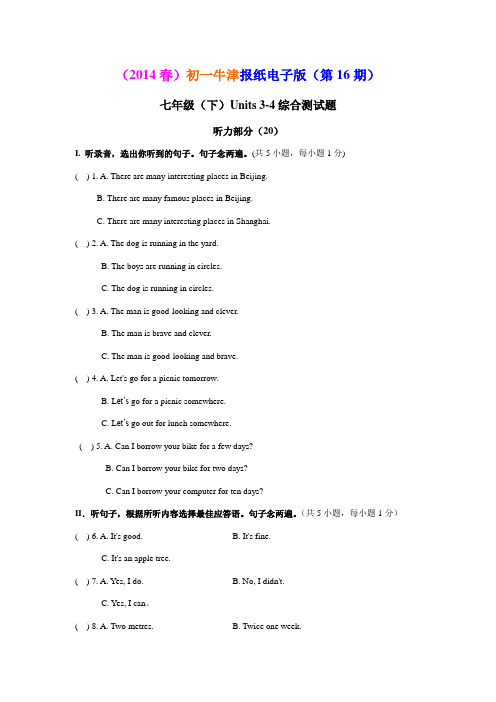
(2014春)初一牛津报纸电子版(第16期)七年级(下)Units 3-4综合测试题听力部分(20)I. 听录音,选出你听到的句子。
句子念两遍。
(共5小题,每小题1分)( ) 1. A. There are many interesting places in Beijing.B. There are many famous places in Beijing.C. There are many interesting places in Shanghai.( ) 2. A. The dog is running in the yard.B. The boys are running in circles.C. The dog is running in circles.( ) 3. A. The man is good-looking and clever.B. The man is brave and clever.C. The man is good-looking and brave.( ) 4. A. Let's go for a picnic tomorrow.B. L et‟s go for a picnic somewhere.C. L et‟s go out for lunch somewhere.( ) 5. A. Can I borrow your bike for a few days?B. Can I borrow your bike for two days?C. Can I borrow your computer for ten days?II.听句子,根据所听内容选择最佳应答语。
句子念两遍。
(共5小题,每小题1分)( ) 6. A. It's good. B. It's fine.C. It's an apple tree.( ) 7. A. Yes, I do. B. No, I didn't.C. Yes, I can。
(2014春)七年级报纸电子版·牛津深圳版(第28期)
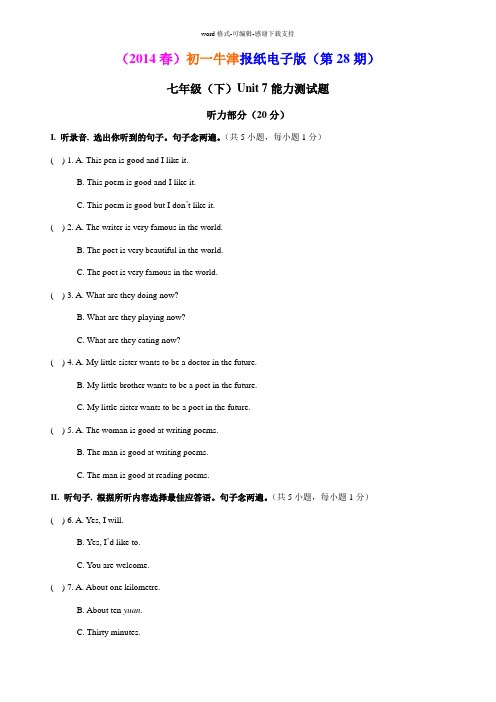
(2014春)初一牛津报纸电子版(第28期)七年级(下)Unit 7能力测试题听力部分(20分)I. 听录音, 选出你听到的句子。
句子念两遍。
(共5小题,每小题1分)( ) 1. A. This pen is good and I like it.B. This poem is good and I like it.C. This poem is good but I don’t like it.( ) 2. A. The writer is very famous in the world.B. The poet is very beautiful in the world.C. The poet is very famous in the world.( ) 3. A. What are they doing now?B. What are they playing now?C. What are they eating now?( ) 4. A. My little sister wants to be a doctor in the future.B. My little brother wants to be a poet in the future.C. My little sister wants to be a poet in the future.( ) 5. A. The woman is good at writing poems.B. The man is good at writing poems.C. The man is good at reading poems.II. 听句子, 根据所听内容选择最佳应答语。
句子念两遍。
(共5小题,每小题1分)( ) 6. A. Yes, I will.B. Yes, I’d like to.C. You are welcome.( ) 7. A. About one kilometre.B. About ten yuan.C. Thirty minutes.( ) 8. A. Yes, she is.B. No, she can’t.C. Yes, she was.( ) 9. A. It’s expensive.B. I go to work by car.C. Taking a plane.( ) 10. A. It’s interesting.B. I wrote it.C. You must be tired.III. 听对话, 根据对话内容选择最佳答案。
七年级(上)N深版综合复习版35-40期答案

七年级(上)牛津深圳综合复习版35-40期参考答案第2页Keys: (One possible version)一、1. elder 2. friendly 3. yourself 4. Japan 5. hobbies 6. Germany 7. age 8. dream 9. mountains 10.engineer 11. countries 12. complete 13. sound 14. world 15. flat 16. grammar二、1. is far from 2. all over the world 3. best wishes 4. In my free time 5. on the Internet 6. livedwith 7. is close to 8. went to school 9. make friends with 10. is good at 11. hear from 12. Listening to 13. take a bath 14. would like to三、1. My favorite subject is English. 2. My dream is to be a doctor. 3. I hope to stay with myfamily at weekends. 4. Welcome to our school! 5. I come from Guangzhou, and I grow up in Guangzhou. 6. I would like to go shopping online now.四、1. a 2. an 3. an 4. a 5. a 6. an 7. an 8. When 9. Where 10. How 11. How long 12. Why13. Howoften 14. How soon 15. Which 16. Whose 17. What第3页Keys: (One possible version选择题除外)I. 1. hobby 2. flat 3. engineer 4. Japan 5. grammar 6. sound 7. age 8. elder 9. dream10. countriesII. 11. asked; about 12. go to school 13. in my free time 14. all over 15. on the Internet III. 16-20 ACBDC 21-25 ABBDD 26-30 ACACAIV. 31-35 BACCD 36-40 BACBCV. 41-45 CCDDDVI. 46. Germany 47. swimming 48. wishes 49. to paint 50. pay 51. friends 52. parents53. subjects 54. reading 55. to learnVII.Andy’s blogHello, welcome to Andy’s blog. I’m from the USA. I’m thirteen years old. Now I’m studying in an international school in Guangzhou. Our school is big and beautiful. There are more than 2,000 students from different countries. There are many trees and flowers. Teachers are very friendly and give us a lot of help. We love their classes, because teachers always make their classes interesting. My favourite sport is basketball. My dream is to be a famous basketball star like Kobe. I also like traveling. I want to know more about China. Would you like to make friends with me? Please write to me at .【书面表达写作指导】本次书面表达要求写一篇介绍自己的博客。
(2014春)七年级报纸电子版·牛津深圳版(第04期)

(2014春)初一牛津报纸电子版(第04期)Unit2词语笔记词语点将台Word powerpossible【展示】1. It is possible to finish the work by the end of the week.这周末完成这项工作是可能的。
2. Would it be possible for me to leave a message for her?我可以给她留个话吗?3. We spend every possible moment on the beach.我们一有时间就去海滩。
4. He will possibly come here next month.他可能下个月会来这儿。
【总结】possible是形容词,意为“可能的”,可放be动词之后,如例1和例2:也可放名词前,如_______;其副词形式为________,如例4。
【运用】根据汉语意思,完成句子。
1. 你能说出这个问题可能的答案吗?Can you tell the _______ answers to the question?2.她昨天可能去公园了。
She ______ went to the park yesterday.excellent【展示】1. This is really an excellent meal.这真是一顿美味佳肴。
2. The hotel has excellent service.这旅馆有优质的服务。
【总结】excellent作形容词讲有“优秀的”的意思,可用来修饰名词。
若前面加不定冠词,要用_______,如例1。
【运用】根据汉语意思,完成句子。
3.她会讲非常棒的中文。
She can speak _______ Chinese.4.我认为这个小男孩很优秀。
I think the little boy is very __________.lie【展示】1. The city lies in the center of this country.这个城市位于这个国家的中部。
七年级第10期英语周报(GZ)参考答案与解析ppt课件
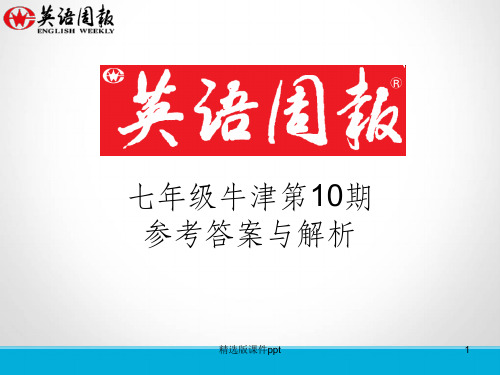
响,而是由其量词的单复数而定。
一步说明,由此可知该空应选B项。
30.答案D。根据上下文,可知在一个国
家的人向人造卫星发送呼叫后,人造卫
星将此呼叫转送到另一个国家的通讯站。
故选D项。
精选版课件ppt
28
七年级第10期 第2-4版
三、阅读 第一节 阅读理解
A 【语篇解读】本文以第一人称介绍了 Sara Green以及其家人的一些基本情况。 31.答案B。细节理解题。由第一段第五
精选版课件ppt
15
七年级第10期 第2-4版
10.答案A。本题考查结构ask sb not to do sth。ask sb not to do sth,意为 “叫某人不要做某事”。
精选版课件ppt
16
七年级第10期 第2-4版
第三节 语法选择 11.答案D。该空考查特殊疑问词。
whose用于询问谁的;how用于询问 方式或如何;why用于询问原因; where用于询问地点。根据下一句, 可推断出该空应选D项来提问垃圾的 去处。
的用法。stop doing sth,意为“停止 做某事”。stop后亦可接动词不定式 构 成结构stop to do sth,意为“停下来 去 做某事”。
精选版课件ppt
12
七年级第10期 第2-4版
7.答案A。本题考查可数名词与不可数 名词及其修饰词。apple为可数名 词,且在句中为单数形式,故排除D 项。bread为不可数名词,不可数名 词不与基数词连用,故排除B项。不 可数名词多用“不定冠词/基数词+量 词+of”这一结构来表示数量。three pieces of,意为“三块/条/件……”。
(2014春)七年级报纸电子版·牛津深圳版(第10期)
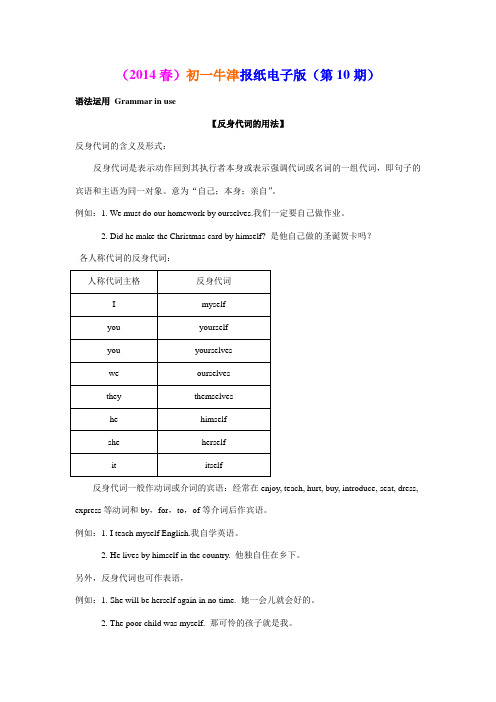
(2014春)初一牛津报纸电子版(第10期)语法运用Grammar in use【反身代词的用法】反身代词的含义及形式:反身代词是表示动作回到其执行者本身或表示强调代词或名词的一组代词,即句子的宾语和主语为同一对象。
意为“自己;本身;亲自”。
例如:1. We must do our homework by ourselves.我们一定要自己做作业。
2. Did he make the Christmas card by himself? 是他自己做的圣诞贺卡吗?各人称代词的反身代词:人称代词主格反身代词I myselfyou yourselfyou yourselveswe ourselvesthey themselveshe himselfshe herselfit itself反身代词一般作动词或介词的宾语:经常在enjoy, teach, hurt, buy, introduce, seat, dress, express等动词和by,for,to,of等介词后作宾语。
例如:1. I teach myself English.我自学英语。
2. He lives by himself in the country. 他独自住在乡下。
另外,反身代词也可作表语,例如:1. She will be herself again in no time. 她一会儿就会好的。
2. The poor child was myself. 那可怜的孩子就是我。
【介词的用法】介词又称为前置词,它不能单独作句子的成分,必须与名词、代词或相当于名词的其词类、短语构成介词短语才能充当句子成分。
以下是一些常见方位介词的用法:1.at表示“在……处”,一般指较小的比较具体的地点。
例如:He isn't at school. He is at home. 他不在学校,他在家。
2.in表示“在……内部;在……里面”的意思。
(2014春)七年级报纸电子版·牛津深圳版(第14期)

(2014春)初一牛津报纸电子版(第14期)七年级(下)Unit 4 能力测试题听力部分(20)I. 听录音,选出你听到的句子。
句子念两遍。
(共5小题,每小题1分)( ) 1. A. How can a tree live?B. How long can a tree live?C. Where can a tree live?( ) 2. A. It can pass information to others.B. It can send information to others.C. It can pass information to people.( ) 3. A. He thanked me for my help.B. He thanked me for helping him.C. I thanked him for his help.( ) 4. A. Can you tell me when you leave?B. Can you tell me where you live?C. Can you tell me why you leave?( ) 5. A. There are more and more trees in the world.B. There are a few trees in the world.C. There are fewer and fewer trees in the world.II.听句子,根据所听内容选择最佳应答语。
句子念两遍。
(共5小题,每小题1分)( ) 6. A. Yes, it is. B. No, I don't.C. It's cold.( ) 7. A. Yes, it is cold. B. I'm studying.C. It's sunny now.( ) 8. A. I'm watching TV. B. They are talking.C. They are at home.( ) 9. A. Pretty good. B. I'm well.C. It is going to its home.( ) 10. A. Yes, he is. B. No, she isn't.C. She is a good girl.III.听对话,根据对话内容选择最佳答案。
(2014春)七年级报纸电子版·牛津深圳版(第17期)

(2014春)初一牛津报纸电子版(第17期)七年级(下)Unit 1- 4综合能力测试题听力部分(20分)I. 听录音, 选出你听到的句子。
句子念两遍。
(共5小题,每小题1分)( ) 1. A. My brother is tall and fat.B. My sister is tall and strong.C. My brother is tall and strong.( ) 2. A. The boys are playing football on the playground.B. The boys like playing football on the playground.C. The boys often play football on the playground.( ) 3. A. Cats are our friends and we should protect them.B. Animals are our friends and we should protect them.C. Animals are your friends and you should protect them.( ) 4. A. Trees make our city more beautiful.B. Trees can make our city beautiful.C. Trees can make our city more and more beautiful.( ) 5. A. My grandfather is a good man.B. My grandmother is a kind woman.C. My grandfather is a kind man.II. 听句子, 根据所听内容选择最佳应答语。
句子念两遍。
(共5小题,每小题1分)( ) 6. A. He likes it very much.B. No, he doesn’t.C. Because he likes playing soccer.( ) 7. A. No, they shouldn’t.B. Yes, they would.C. No, they aren’t.( ) 8. A. I like English very much.B. Six.C. School is over.( ) 9. A. On weekdays. B. On foot.C. With her friends.( ) 10. A. At 8 am. B. After school.C. At 8 pm.III. 听对话, 根据对话内容选择最佳答案。
学英语报纸深圳(S)七下暑假专版答案

七年级深圳(S)暑假专版参考答案第1版暑假作业(一)词汇与句型篇词汇运用Ⅰ. 1-5 cdeabⅡ. 1. miss 2. south 3. patient 4. paragraphs 5. wine6. excellent7. probably8. address9. skiing 10. smellⅢ.1-5 DABBAⅣ. 1. far away from 2. go to work 3. take care of4. full of fun5. made fun of句型演练Ⅰ. 1. Why don’t you 2. What; look like 3. Where; like to go4. not near5. prefer toⅡ. 1. answer questions 2. plan to 3. make friends with4. the capital of5. helps me withⅢ. 1. sightseeing 2. shopping 3. to play 4. get 5. making第2版暑假作业(二)语法篇Ⅰ. 1-5 BACDB 6-10 DBADCⅡ. 1. is good at playing 2. Which woman 3. read books and collect coins4. How long did she play5. Where do they hope to6. Is there a blue pen7. Why didn’t Linda 8. but he still works 9. Did Mary find10. How are her parentsⅢ. 1. forgot 2. lies 3. greetings 4. jokes5. skiing6. patient7. France8. probablyⅣ. 1. with 2. of 3. about 4. of 5. as6. at7. in8. on9. to 10. upⅤ. 1. C the改为a 2. C but改为so 3. D august改为August4. A A改为The5. B piano之前加the第3版暑假作业(三)读写综合篇补全对话1-5 EACBF 6-10 CFADG完形填空1-5 BACAC 6-10 CCADD阅读理解1-5 ADCCD书面表达One possible version:I had a three-day holiday in Lijiang, Yunnan with my mother. On the first day, we visitedsome famous places and chatted with local people. On the second day, we ate different kinds of local foods and listened to music in the bar. On the third day, we went to the street markets. They sold many interesting things. We bought some presents for our friends.第4版暑假作业(四)词汇与句型篇词汇运用Ⅰ. 1. airport 2. blind 3. harmful 4. anywhere 5. finallyⅡ.1. radio 2. means 3. nothing 4. hole 5. major6. oxygen7. towel8. barking9. saved 10. discussingⅢ.1-5 BABCDⅣ. 1. try our best 2. Because of 3. felt proud of4. in front of5. at the bottom of6. woke up7. thinking about 8. as a result 9. fight against 10. looked around句型演练Ⅰ. 1. Where is 2. Is; swimming 3. on the phone 4. what to eat 5. try toⅡ. 1. by myself 2. More than 3. With Helen’s help 4. You’d better 5. fire engine Ⅲ. 1. He enjoyed himself in the living room. 2. There is a toy bear next to the desk.3. I think dogs are very helpful animals.4. Why do trees produce oxygen for us to breathe?5. Ivan is eating an ice cream on the beach.第5版暑假作业(五)语法篇Ⅰ. 1-5 DBACB 6-10 CADBAⅡ. 1. Is Peter watching 2. What is Linda doing 3. enjoyed ourselves4. between Bob and Tony5. Yes, they are6. without others’ help7. Are there five boys sitting 8. Where can they see9. My sister isn’t swimming 10. Why is Tom stayingⅢ. 1. is having 2. himself 3. be waiting 4. don’t believe 5. itself6. isn’t listening7. saw8. are making9. ourselves 10. are taking Ⅳ. 1. Your toy car is in the box. 2. The boy can’t wash the shoes himself.3. Jenny is sitting beside me.4. Who is singing an English song?5. There is a river in front of our school.Ⅴ. 1. A does改为is 2. D on改为in 3. D our改为ourselves4. C watched改为is watching5. D are tasting改为taste第6版暑假作业(六)读写综合篇补全对话1-5 CAEFB 6-10 BECGA完形填空1-5 DBBDA 6-10 CBCAC阅读理解1-5 DDBCD书面表达One possible version:Sun Yang was born in December, 1991 in Zhejiang Province. He likes listening to rock music. When he is free, he reads the comic book Conan. His fans call him “Dabaiyang”. He started to join the game in 2006 and then became famous. He got two gold medals in 2012 London Olympics.第7版暑假作业(七)词汇与句型篇词汇运用Ⅰ. 1-5 daecbⅡ. 1. drop 2. experiment 3. return 4. bank 5. quantity6. anyone7. wire8. valuable9. fridge 10. replyⅢ. 1-5 BDBCAⅣ. 1. dried up 2. turned off 3. a packet of 4. pocket money 5. in a way6. leave; on7. tidy up8. returned; to9. add; to 10. power station句型演练Ⅰ. 1. How much salt is there 2. time for us to 3. Yes; you may4. Are there three books5. can’t cook or drive a carⅡ. 1. where she comes from 2. continued cooking lunch 3. Do we need to4. Everyone mustn’t/shouldn’t waste5. more than enough chairsⅢ. 1. smoking 2. washing 3. Is 4. made 5. to do6. play7. connected8. go9. are 10. to buy第8版暑假作业(八)语法篇Ⅰ. 1-5 ABDBB 6-10 CADCBⅡ. 1. he can’t 2. you may 3. What can those 4. How many5. can6. How much7. can’t8. CanⅢ. 1. can 2. can’t 3. must 4. mustn’t 5. may notⅣ. 1. enough 2. too much 3. too few 4. too many 5. too littleⅤ. 1. May/Can 2. can 3. must 4. enough 5. mustn’tⅥ. 1. B to take改为take 2. A How much改为How many 3. C many改为much4. A may not改为can’t5. D a few改为a little第9版暑假作业(九)读写综合篇补全对话1-5 BFDAC 6-10 CAEGB完形填空1-5 BCDAC 6-10 DABCB阅读理解1-5 CDBCD书面表达One possible version:My home was in a small town in Beijing. There was a small garden in front of my house. There were two small bedrooms, a small kitchen and a big living room with many flowers in the house. There was only a store and a park near my house. It was quiet and comfortable to live there.第10版暑假作业(十)词汇与句型篇词汇运用Ⅰ. 1. ordinary 2. complete 3. agree 4. satellite 5. hostⅡ. 1. poem 2. order 3. smile 4. height 5. shower6. Diamond7. shoot8. achieve9. train 10. decideⅢ. 1-5 DCABAⅣ. 1. more and more 2. in the future 3. go outside 4. newspaper stand5. look like6. used to7. is worried about8. The beginning of9. at all 10. go sailing句型演练Ⅰ. 1. Don’t turn off 2. did Mary use to 3. quiet the park is4. How long did; last5. my favourite hobbyⅡ. 1. to buy himself breakfast 2. to bring a map 3. an excellent doctor she is4. has no taste5. a good knowledge ofⅢ. 1. making 2. called 3. to talk 4. to look 5. laughingⅣ. 1. When it is sunny, I usually go fishing. 2. The baby kept crying until his mother got back.3. Do you know the new site for our factory?4. We used to count stars on clear nights.5. She was excited because she won the first prize.第11版暑假作业(十一)语法篇Ⅰ. 1-5 DACAB 6-10 CABADⅡ. 1. not listen 2. Did; use to 3. What; use to do 4. How delicious5. When did; use6. What a tall girl7. didn’t use8. What did you doⅢ. 1. work 2. ride 3. running 4. don’t open 5. wentⅣ. 1. Be careful 2. used to be 3. What an 4. When 5. Let’s notⅤ.1. What a great film it is! 2. Turn off the lights before you go to bed.3. Did you use to be a shy girl?4. Look at page 5!5. How interesting the film is!Ⅵ. 1. B looks改为look 2. A Do改为Did 3. A What改为How4. C before改为after5. A watches改为watched第12版暑假作业(十二)读写综合篇补全对话1-5 AEBDC 6-10 DBFCA完形填空1-5 ACCBD 6-10 ACBDC阅读理解1-5 CDCCD书面表达One possible version:Hello, everyone! My name is Betty. I’m from America and I’m 14 years old. I’d like to be the class monitor. I can sing, dance and play the piano. And I do well in tennis. I’m kind and I’m always ready to help others. I can get on well with everyone. Please choose me and I will be your best friend.第13-14版暑假作业(十三)Words & PhrasesⅠ. 1. jokes 2. tick 3. lies 4. bottom 5. furniture6. support7. valuable8. fridge9. aloud 10. touchⅡ. 1-5 CBCADⅢ. 1. tidy up 2. took care of 3. was strict about4. is famous for5. made fun of6. come from7. going sightseeing 8. turn off 9. woke up 10. arrive atSentencesⅠ. 1. learning 2. to eat 3. herself 4. being 5. known6. listening7. to look8. playing9. to climb 10. to goⅡ. 1. What do; think of 2. like skiing best 3. Did; use to4. No; needn’t5. Don’t sleepⅢ. 1. in a low voice 2. not to; a drop of 3. try our best4. what to wear5. at the momentⅣ. 1. The house on the mountain is made of wood.2. They are proud of their son.3. John read a book on the sofa. Soon, he fell asleep.4. The woman in a red dress is playing the violin.5. The police led the children to another room.LanguageⅠ.1-5 CDABC 6-10 DDCABⅡ. 1. to bring 2. hobbies 3. French 4. lively 5. shot6. cooker7. container8. probably9. beginning 10. skiingSpeakingⅠ. 1-5 BDEACⅡ. 1-5 GAEFCReading1-5 DBCBB 6-10 ACADCWritingOne possible version:Li Yundi was born on October 7, 1982 in Chongqing. He is a Chinese classical pianist. He began studying piano at the age of 7. He studied with his teacher Dan Zhaoyi, one of the most famous piano teachers in China, at the age of 9. In 1994 he won the Children’s Piano Competition in Beijing. He won the 1998 Missouri Southern International Piano Competition. Now he’s famous all over the world.第15-16版暑假作业(十四)Words & PhrasesⅠ. 1. add 2. rules 3. wires 4. voice 5. imagine6. lasts7. diamond8. shower9. career 10. ordinaryⅡ. 1-5 ABABCⅢ. 1. is good for 2. made good progress 3. go to work4. looked around5. is interested in6. tells jokes7. go on holiday 8. prefer to 9. switch off 10. for exampleSentencesⅠ. 1. writing 2. feel 3. care 4. to read 5. play6. to take7. watching8. millions9. to visit 10. asleepⅡ. 1. is good at 2. when he was three 3. Where does; lie4. Is; playing5. How muchⅢ. 1. a packet of 2. a bit 3. pocket money4. fight against5. dried upⅣ. 1. Remember to make the pipe connected to the tap.2. We all agreed to invite Gary to the party.3. If you take a taxi, you can arrive at the airport in half an hour.4. My father often works all day and all night.5. I’m strict about my work.LanguageⅠ.1-5 CBDBB 6-10 CACBAⅡ. 1. taking 2. successful 3. seller 4. feeling 5. advice6. to touch7. branches8. to bark / barking9. batteries 10. height SpeakingⅠ. 1-5 FEBADⅡ. 1-5 BEGDAReading1-5 CCDBDWritingOne possible version:Before going to Thailand, you should know these customs there. First, don’t touch others’ heads. That’s because it’s not polite at all. Second, don’t point at others with your finger when you talk to them. Third, men should wear shirts and shoes when visiting temples. Fourth, don’t point at monks with your finger and women can’t shake hands with them.第17-18版暑假作业(十五)Words & PhrasesⅠ. 1. miss 2. member 3. date 4. tower 5. programme6. convenient7. discussing8. harmful9. poems 10. narrowⅡ. 1-5 DBCABⅢ. 1. give up 2. fell asleep 3. take in 4. Millions of5. in fact6. dried up7. by himself8. get down9. all day and all night 10. is made ofSentencesⅠ. 1. learning 2. come 3. reading 4. to get 5. to play6. to come7. to be8. producing9. to call 10. makeⅡ. 1. looks after 2. full of fun 3. What; think of4. he didn’t5. How beautiful; areⅢ. 1. the first prize 2. go outside 3. More and more4. don’t; at all5. a crowd ofⅣ. 1. I would like to be a teacher in the future.2. The woman with long straight hair is Mrs Zhang.3. There are many places of interest for you to visit.4. Don’t touch these wires on the wall.5. We should not only think of ourselves.LanguageⅠ.1-5 ADCAB 6-10 ABAADⅡ. 1. interest 2. knowledge 3. worried 4. finally 5. forgot6. meant7. listening8. go9. supermen 10. groups SpeakingⅠ. 1-5 FCDAEⅡ. 1-5 DAFGCReading1-5 BCDAB 6-10 ACCBAWritingOne possible version:I’m Alice and I have a happy family. My parents love my little brother and me very much. Last month, we went shopping together. When Mum saw a beautiful yellow hat, she stopped. She liked it, but it was too expensive. Then we left. Yesterday was my mother’s birthday. Dad prepared a gift for Mum, and we prepared a gift too. Mum felt very happy and opened the two boxes one by one. She was surprised to see two yellow hats. We all bought the hat for her. Mum wore both of the hats and we all laughed a lot.第19版暑假作业(十六)完形填空1-5 BDCAB 6-10 BADDC阅读理解A篇1-5 DCDCDB篇1-5 CABDC第20版暑假作业(十七)完形填空1-5 CBDDA 6-10 CBADC阅读理解A篇1-5 ACCDDB篇1-5 DBCCA第21-22版七年级下册综合测试(一)1-5 BCADC 6-10 AACBA 11-15 BBAAC 16-20 BCDCB21-25 BCACD 26-30 CCDCB31-35 BDCAA 36-40 BDCDD 41-45 BCBCB 46-50 ABADC51-55 CEDBA 56-60 BGACD61. to give 62. probably 63. swimming 64. fun 65. to get66. successful 67. to help 68. working 69. to finish 70. skiing71. One possible version:Our Music Festival is coming. Every class in our school will give a show. I will show an Indian dance with my three good friends, and at the same time Tina will play the piano for us. Each afternoon, we are going to the Music Club to practise dancing. I think our show will be interesting. I hope we can win in the festival.第23-24版七年级下册综合测试(二)1-5 BACBA 6-10 BDABC 11-15 DDDAB 16-20 CADCC21-25 DCBAC 26-30 ACBBD31-35 DCBDD 36-40 BCBCD 41-45 BDDBC 46-50 ACABA51-55 DBAFC 56-60 GBDAC61. Finally 62. to speak 63. receptionist 64. anywhere 65. me66. harmful 67. asleep 68. ourselves 69. discussion 70. helpful71. One possible version:Last Saturday, I went to the old people’s home with my classmates. We bought lots of fruit for them, such as apples, bananas and pears. We not only cleaned the windows but also washed their clothes for them. We chatted with them, too. They were so happy. We had a happy time with them. We’ll see them next Saturday.第25-26版七年级综合测试(三)1-5 CBCAB 6-10 DCABC 11-15 BCDBB 16-20 ABBDC21-25 DDCCA 26-30 DCBDB31-35 CDCDB 36-40 BBDDC 41-45 DCBBC 46-50 AAACC51-55 FCAEB 56-60 CEAFD61. valuable 62. to clean 63. to lock 64. replied 65. batteries66. washing 67. to attend 68. electricity 69. start 70. formed71. One possible version:Robots at home in the futureIn the future, there will be a robot in everyone’s home. Robots will do a lot of things for people. They will help people do the housework like cleaning houses, washing clothes, cooking dinner and looking after children and old people. They will also tell children stories before they go to bed. In a word, robots will be very important in the future.第27-28版七年级下册综合测试(四)1-5 BAAAD 6-10 DABDB 11-15 CCDCA 16-20 DDACC21-25 BCBAB 26-30 CCDAD31-35 DCDBD 36-40 DCBCC 41-45 CBDDC 46-50 CBDCA51-55 CEBDA 56-60 BEGAD61. to shop 62. sailing 63. studying 64. to go 65. first66. fun 67. groups 68. understanding 69. being 70. hobbies71. One possible version:Mike is a busy student at Green School. At the weekend he has got many things to do. On Saturday morning, he’s going to help his mum clean the house. On Saturday afternoon, he’s going shopping for nice food. On Sunday morning, he’s going to have a piano lesson. On Sunday afternoon, he’s going to stay with his family and read a book.第29-30版七年级下册综合测试(五)1-5 BCCBC 6-10 BACDB 11-15 BCDBA 16-20 CBBDB21-25 BCBDA 26-30 CABDC31-35 CDBBD 36-40 BBBDD 41-45 CBDDC 46-50 BCDDD51-55 BFCAD 56-60 ACGBE61. to bark / barking 62. finally 63. helpful 64. woke 65. acts66. seller 67. worried 68. myself 69. feeling 70. height71. One possible version:I think online shopping has three advantages. First, you can almost buy everything on the Internet and it’s very easy. Second, you don’t need to go to shops to choose things. It is convenient to buy things at home. Third, many things are cheaper than those in shops or supermarkets. So I like online shopping.第31-32版七年级下册综合测试(六)1-5 BDCAA 6-10 CBDCB 11-15 BBBAB 16-20 BBDCA21-25 DCABC 26-30 DBCAD31-35 DBDCB 36-40 DBCDD 41-45 BCCDD 46-50 CDBBC51-55 EAFBC 56-60 CGBAD61. eating 62. harmful 63. fought 64. saving 65. danger66. interested 67. playing 68. swimming 69. to connect 70. beginning71. One possible version:My name is Zhang Jing. I was born in Beijing. My first school was Zhongguancun No. 1 Primary School. Miss Liu was my first teacher and she was strict. My good friend Wu Tong was born in Tianjin. Her first school was Xincheng Primary School. Her first teacher was Mrs Zhao. She was friendly.。
- 1、下载文档前请自行甄别文档内容的完整性,平台不提供额外的编辑、内容补充、找答案等附加服务。
- 2、"仅部分预览"的文档,不可在线预览部分如存在完整性等问题,可反馈申请退款(可完整预览的文档不适用该条件!)。
- 3、如文档侵犯您的权益,请联系客服反馈,我们会尽快为您处理(人工客服工作时间:9:00-18:30)。
七年级(上)Unit 3能力测试题听力部分(15分)i.听句子,根据所听内容选择最佳应答句。
句子念两遍。
(共3小题,每小题1分)()1. A. Plant more trees.B. The Earth is important to us.C. The Earth is harmful.()2. A. Too much. B. Yes, there is.C. No, there aren’t.()3. A. What a big bottle!B. Some milk in the bottle.C. It’s a bottle.II.听对话,根据对话内容选择最佳答案。
对话念两遍。
(共4小题,每小题1分)听第一段对话,回答第4-5小题。
()4. Who is Mike?A. Linda’s brother.B. Linda’s cousin.C. Linda’s friend.()5. What language doesn’t Mike speak?A. English.B. Japanese.C. Chinese.听第二段对话,回答第6-7小题。
()6. Why does the river become dirty now?A. A factory puts dirty water into it.B. People throw rubbish into it.C. There are no fish in it.()7. What are they talking about?A. Planting more trees.B. Protecting the river.C. Throwing rubbish.Ill.听短文,根据所听内容选择最佳答案。
短文念两遍。
(共3小题,每小题1分)()8. What can children do at their homes to protect the Earth?A. Take a short shower.B. Help their parents do housework.C. Clean the rooms.()9. Which of the following is NOT mentioned (提及)to protect the Earth at school?A. Planting trees.B. Picking up rubbish.C. Loving the trees and grass in school.()10. Who is the speaking mainly (主要地)for?A. Parents.B. Teachers.C. Students.IV.听短文,根据所听内容补全下列小短文。
短文念两遍。
(共5小题,每空1分)The Earth is our mother. Without the Earth, there is no (11) _________. It gives us enough water, food, (12) _________and so on. I can even say we can only (13) _________on Earth. There is only one Earth (14) _________, so please protect it, and protect our“mother”. We can protectit from little things such as (15) _________and planting trees. So please do it right now for ourselves and our children.笔试部分(85分)第一卷选择题(55分)I.词汇测试。
(10分)i)从下面每小题的A、B、C三个选项中选出可以替换划线部分的最佳选项。
(共5小题,每小题1分)()1. — The Earth is our home. We should protect it.—Right. Let’s begin now.A. make ... cleanB. make ... safeC. make... beautiful()2. — Tom, you must wash your hands before dinner.—OK, Mom. I will.A. canB. shouldC. have to()3. —Is there a large tree next to your house?—Yes. It lives more than 100 years.A. bigB. smallC. long()4. — Could you provide us with some help?—No problem!A. borrowB. giveC. buy()5. — Who pollutes this river?—Some factories. We should call on people to protect the river.A. makes ... dangerousB. makes ... roundC. makes ... dirtyii)根据句子意思,从下面每小题的A、B、C三个选项中选出恰当的词语完成句子。
(共5 小题,每小题1分)()6. If you want to know a __________, you want to know something real.A. factB. lieC. problem()7. If you __________ animals, you make them become dead.A. protectB. killC. bum()8. — There is too much __________ now.—Yes. People should not pollute the Earth.A. energyB. practiceC. pollution()9. —Tom,don’t __________ these old books. We can give them to other children.—OK, Dad.A. throw awayB. look forC. get in()10. — What can we do to protect the Earth?—__________A. Going outside is a good idea!B. We can take our own shopping bags.C. We can go shopping together.II.完形填空。
(15分)阅读下面短文,从短文后所给的A、B、C 三个选项中选出能填入相应空白处的最佳选项。
(共10小题,每小题1.5分)It is very important to deal with (处理)the rubbish in cities. For one thing, rubbish may make a lot of 11. It may pollute the air, the water and the places we 12 in. For another, too much rubbish is 13 for people’s health. In our city, people deal with the rubbish 14. First, people think there are 15 kinds of rubbish. They can 16 the good kind of rubbish again, for example, old newspapers and glass. People put the bad kind of rubbish under the 17. Before the waste water 18 into the river, people make it become 19. People even make laws (法律)against rubbish. But that’s not enough. We all must try our best to 20 rubbish from polluting the Earth. It is important to save our city and our living places.()11. A. field B. money C. pollution()12. A. live B. stand C. arrive()13. A. sad B. bad C. good()14. A. hardly B. earlyC. well()15. A. one B. two C. three()16. A. complete B. throw C. use()17. A. ground B. river C. sea()18. A. finds B. goes C. meets()19. A. clean B. short C. dirty()20. A. like B. help C. stopIII.阅读理解。
(30分)阅读下列短文,从下面每小题的A、B、C、D四个选项中选出最佳选项。
(共20小题,每小题1.5分)AThere is a greedy crocodile (贪婪的鳄鱼). He feels really hungry and he wants to eat something. Then, he sees a little boy. The boy has some chicken in his hand. The crocodile wants to eat both the boy and his chicken.The crocodile says,“Oh, little boy! Could you please give me some chicken?”The boy says, “Oh no, you may eat me.”The crocodile says, “I don’t eat you.”So the boy goes near the crocodile and gives him the chicken. But the crocodile catches his arm. There comes a rabbit. She wants to help the boy. The crocodile wants to eat the rabbit first, so helets the boy’s arm go.At that time, the boy runs away and the rabbit runs away too. At last, the greedy crocodile doesn’t get his dinner.()21. What’s in the little boy’s hand?A. Bread.B. Chicken.C. Tomatoes.D. Carrots.()22. Why does the crocodile let the boy’s arm go?A. Because the boy’s mother comes to help him.B. Because he doesn’t want to eat the boy.C. Because he wants to eat the rabbit first.D. Because he is too tired to eat.()23. What does the crocodile eat at last?A. The chicken.B. Nothing.C. The boy.D. The rabbit.()24. What do you think of the boy?A. Kind.B. Happy.C. Brave.D. Naughty.()25. What can we learn from the story?A.People should work hard to get food.B. Greedy people may get nothing at last.C. People should not talk with others.D. Crocodiles and rabbits are good friends.B()26. What is NOT the writer’s idea about water?A. We drink water every day.B. We use water to clean things.C. We should not waste water.D. There is little water in every place.()27. Why should we NOT drive too much?A. Because cars are dangerous.B. Because cars need much money.C. Because cars waste water.D. Because cars use too much energy.()28. Which of the following is TRUE?A. There is much oil on Earth.B. We should cut down trees to for tee Earth.C. Too much plastic is not good for the Earth.D. We should not use glass bottles and paper bags.()29. What does the passage mainly want to tell us?A. To save energy.B. To protect the Earth.C. To protect trees.D. Not to use plastic.()30. Who is the passage for?A. Everyone.B. Students.C. Factories.D. Parents.CVending machines (自动售机)are very popular now. You can find them here and there. People can buy different things from them, like snacks and drinks. Now we can even buy train tickets and newspapers in some places. In some places, you can get a bottle of Coke from the vending machine, but in others, you can’t. Some vending machines sell cigarettes (香烟). We call them “cigarette machines”. But you can9t see these machines in some places in the United States now. They are not good for children. And only some, clubs have them. Children cannot get into these places.How does a vending machine work? If you want to buy a bottle of Coke, you can find its price (价格)on the machine. Put the money into the machine, and press the button (按按钮)of the Coke, and then you can get your Coke. Vending machines make our life easy and interesting.()31. What can we NOT buy from a vending machine according to the passage?A. Newspapers.B. Coke.C. Train tickets.D. Clothes.()32. Which of the following is TRUE about vending machines?A. All of them in the world are the same.B. Only the United States has them.C. Everyone can’t get cigarettes from them.D. In some places, yon can’t get Coke from them.()33. What does the underlined word “them”refer to (指的是)?A. Parents.B. Children.C. Cigarette machinesD. Clubs.()34. How can you buy a bar of chocolate in a vending machine?①Press the button of the chocolate.②Put money into the machine.③Read the price of the chocolate.④Get your chocolate.A. ①②③④B.①③②④C.③②①④D.③②④①()35. What is the best title for the passage?A. How to buy CokeB. Vending machines in ChinaC. How to get moneyD. Vending machinesDSaving the Earth shouldn’t be so difficult if we can do the following.First, we should take our time. There is no need to hurry. We can walk or ride a bike to work. Second, we should smell the Earth. Open the windows. Turn off the air-conditioner, and at the same time, save the energy.Third, we should enjoy cooking at home and having meals at our dinner table. So we can use our own bowls and chopsticks, not the plastic ones.Fourth, we should spend our weekends and holidays in the park playing games or just riding a bike around.Fifth, we should learn how to make good use of (充分利用)old things in the house, in the garden, or in the kitchen.Lastly, no one really has a mountain or a sea. Don51 throw rubbish here and there.()36. What does the writer think of saving the Earth?A. It should be safe.B. It should be difficult.C. It should be easy.D. It should be happy.()37. What do the underlined words “take our time” mean?A. Be happy.B. Be slow.C. Be fast.D. Be sad.()38. What can we know from the passage?A. Eating at home can help save the Earth.B. Enjoying air outside can help save energyC. Not buying new things can save the Earth.D. Throwing old things away is good for the Earth.()39. How many ideas about saving the Earth are mentioned (提及)in the passage?A. Four.B. Five.C. Six.D. Seven.()40. What is the passage about?A. What the Earth looks like.B. How to enjoy living on Earth easily.C. How to protect the Earth in an easy way.D. How to protect the Earth in an interesting way.第二卷非选择题(30分)IV.连词成句。
